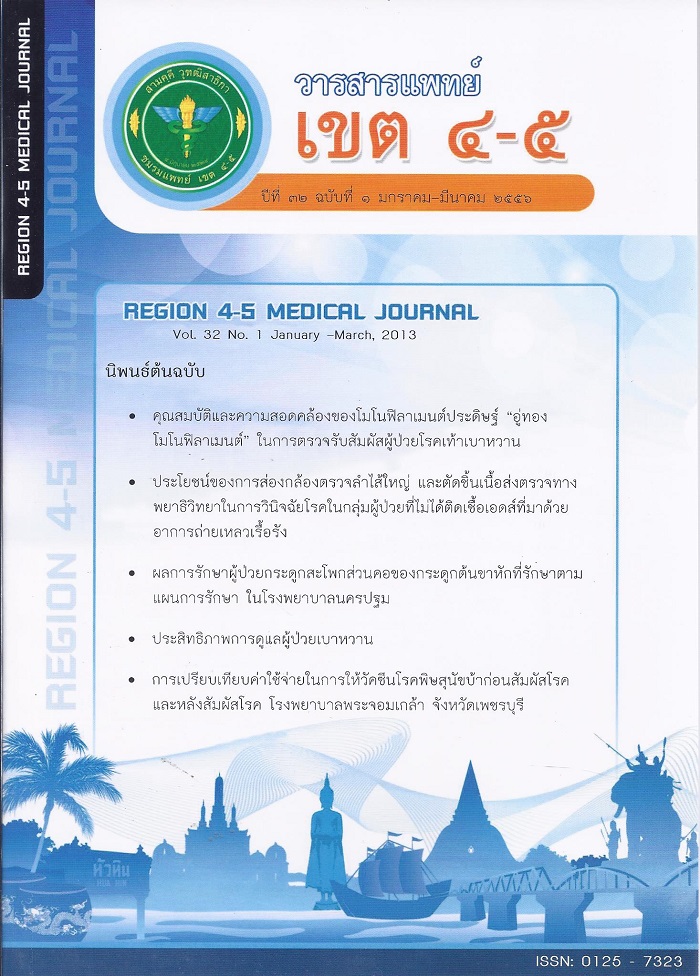ประสิทธิผลโปรแกรมการเยี่ยมบ้านร่วมกับการติดตามทางโทรศัพท์ ของผู้ป่วยโรคเบาหวานโรงพยาบาลบ่อพลอย
บทคัดย่อ
This quasi-experimental research aimed to study the effectiveness of home visiting combined with follow-up call regarding to diabetic knowledge, self-care behaviors, and blood sugar level in diabetic patients of Bophloi Hospital. The sample consisted of 60 diabetic patients by purposive sampling who got blood sugar level of two final tests before the trial more than 140 mg percent. All of them had no chronic complication, could be connected by telephone, and consented to participate in the study. They were divided into two groups; experimental group and comparison group, each group consisted of 30 people. The experimental group received home visiting program combined with follow-up call, meanwhile, the comparison group received regular home visiting. Data were collected before and after the trial for 8 weeks. Study conducting was implemented during September 1-December 30, 2011. Tools for study were questionnaires which composed of personal data, diabetic knowledge, self- care behaviors and blood sugar record form. Data were analyzed by using descriptive statistics, chi-square test/ Fisherís exact test, independent t-test and paired sample t-test. The results showed that after receiving home visiting program combined with follow-up call, experimental group got more average score of diabetic knowledge and self-care behaviors ( = 12.6 and 11.4, respectively) than comparison group (
= 11.4 and 10.1, respectively). Moreover, experimental group had blood sugar level (
= 173.3) lower than comparison group (
= 228.8) which received only home visiting with statistical significance (p-value < 0.05). According to comparison result of home visiting combined with follow-up call of experimental group between before and after the trial, found that after receiving program, they got more average score of diabetic knowledge and self-care behaviors (
= 12.6 and 12.4, respectively) than before receiving program (
= 10.8 and 10.0, respectively) as well as had blood sugar level (
= 173.3) lower than before receiving program (
= 261.0) with statistical significance (p-value < 0.001). According to the above results, home visiting combined with follow-up call could afford effectiveness for diabetic knowledge, self-care behaviors, and blood sugar level better than receiving only home visiting program. Therefore, the program should be continually applied for caring, controlling and monitoring diabetic patients.
ดาวน์โหลด
เผยแพร่แล้ว
รูปแบบการอ้างอิง
ฉบับ
ประเภทบทความ
สัญญาอนุญาต
ลิขสิทธิ์บทความเป็นของผู้เขียนบทความ แต่หากผลงานของท่านได้รับการพิจารณาตีพิมพ์ลงวารสารแพทย์เขต 4-5 จะคงไว้ซึ่งสิทธิ์ในการตีพิมพ์ครั้งแรกด้วยเหตุที่บทความจะปรากฎในวารสารที่เข้าถึงได้ จึงอนุญาตให้นำบทความในวารสารไปใช้ประโยชน์ได้ในเชิงวิชาการโดยจำเป็นต้องมีการอ้างอิงถึงชื่อวารสารอย่างถูกต้อง แต่ไม่อนุญาตให้นำไปใช้ในเชิงพาณิชย์




